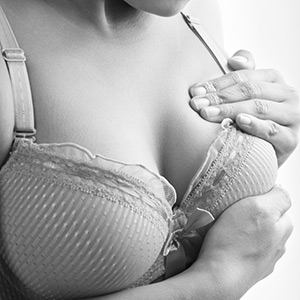Has your Breast Augmentation changed? Do one or both of your breasts feel harder or more firm than it used to? Do you feel pain or pulling? Has the appearance of one or both breasts changed? Does one breast sit higher or lower than the other? You may have Capsular Contracture which is one of the most common complications after breast augmentation surgery.
All breast implants form scar tissue. Capsular contracture occurs when the scar tissue which forms (called the capsule) constricts tightly against the implant. It can make the breast hard, misshapen and painful. It may happen within months or years after surgery. The problem varies based on implant type and other factors but can occur with both saline implants and silicone implants.

The capsular formation is an abnormal response of the immune system to foreign materials in the human body that results in:
The occurrence of capsular contraction follows the formation of capsules of tightly-woven collagen fibers, created by the immune response to the presence of foreign objects: such as breast implants. Capsular contracture occurs when the collagen-fiber capsule tighten and squeeze the implant. This medical complication can be uncomfortable to very painful and might distort the look of the breast implant and breast. All causes are not known, but, factors common to its incidence include bacterial contamination, rupture of the breast implant shell, leakage of the silicone gel filling, and hematoma.
Because capsular contracture is a consequence of the immune system defending the patient’s bodily integrity and health, it might reoccur, even after the requisite corrective surgery for the initial incidence. The degree of an incidence of capsular contracture is graded using a four-grade scale:
- Grade I — the breast is normally soft and appears natural in size and shape
- Grade II — the breast is a little firm, but appears normal
- Grade III — the breast is firm and appears abnormal
- Grade IV — the breast is hard, painful to the touch, and appears abnormal
Submuscular breast implant placement has a reduced rate of Capsular Contracture. Also using textured implants reduces the chances. The correction of capsular contracture might require the surgical release or removal of the entire thickened capsule surrounding the breast implant and in most cases the breast implant, itself.
Closed capsulotomy (disrupting the capsule via external manipulation), a common maneuver for treating hard capsules is sometimes performed but can be very painful. Non-surgical methods of treating capsules include massage, external ultrasound, and, pulsed electromagnetic field therapy.
One other choice for treatment of Capsular Contracture is Radial Pulse Therapy which Dr. Parker often recommends when appropriate. Radial Pulse Therapy (RPT) is a noninvasive treatment that delivers shock wave pulses that are both consistent and comfortable with no downtime. RPT can replace the need for manual and painful vigorous massage often used by surgeons to break up scar tissue.
Each treatment is about 15 minutes and our patients report that they experience a sense of relief after the first treatment. After multiple treatments, they report decreased sensitivity and softer more natural feeling breasts.
If yoy have a Capsular Contracture or think you may, come in for a complimentary consultation with Dr. Parker. We can determine if Radial Pulse Therapy may be right for you.
You can also learn more about Breast Implant Removal here.